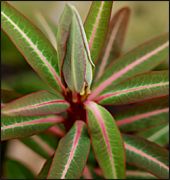The most important relationship I seek to nurture in the treatment room is the one a patient has with their own body. We live in a culture that teaches us to override pain, defer to outside authority, and push through discomfort. Patients often arrive hoping I can “fix” them, but the truth is, we can’t do the work for them. We can offer guidance, insight and support, but healing requires their full participation.
Herbs & Botanicals
Euphorbia Root (gan sui or kan sui)
What is euphorbia root? What is it used for?
Euphorbia is a type of plant native to the Shanxi and Henan provinces of China. It is a perennial herb, with rounded green leaves and small yellow flowers.
The root of euphorbia is used in herbal preparations.
Roots are harvested twice a year, usually at the end of autumn or the beginning of spring. They are peeled, dried in the sun, then prepared with vinegar before being incorporated into herbal remedies.In traditional Chinese medicine, euphorbia root has cold and bitter properties, and is associated with the Lung, Kidney and Large Intestine meridians.
Its functions are to clear heat, reduce swellings, and drive out congested fluids. Euphorbia is used to reduce the incidence of edema, particularly in the
abdomen. It is also used to treat and eliminate intestinal parasites,
and may be employed for acute symptoms related to cirrhosis of the liver,
pleurisy, dysuria, constipation, and inflammation of the lymph glands.
Euphorbia is used to reduce the incidence of edema, particularly in the
abdomen. It is also used to treat and eliminate intestinal parasites,
and may be employed for acute symptoms related to cirrhosis of the liver,
pleurisy, dysuria, constipation, and inflammation of the lymph glands.
How much euphorbia root should I take?
The typical dosage of euphorbia root is 0.5-1 grams per day, usually included as part of a pill or powder for oral use. It should be prepared with vinegar to reduce its toxicity. Some practitioners recommend slightly higher doses (1.5-3 grams). For external uses, the dosage may vary depending on the size of the area being treated.
What forms of euphorbia root are available?
Crude, raw euphorbia root can be found at some Asian markets and herbal shops. Euphorbia is more commonly found as a pill or powder, usually as part of a larger formula.
What can happen if I take too much euphorbia root? Are there any interactions I should be aware of? What precautions should I take?
Euphorbia is considered mildly toxic. As such, it should be used with extreme caution, and only then under the supervision of a licensed, trained health care provider. Large doses of euphorbia may cause a range of maladies, ranging from nausea and vomiting, to severe abdominal pain, to decreased blood pressure and difficult breathing. It should not be taken by women who are pregnant or breastfeeding, or people with diminished immune systems.
In addition, it should not be taken in conjunction with any form of licorice. As always, make sure to consult with a licensed health care practitioner before taking euphorbia root or any other herbal remedy or dietary supplement.References
- Liang A. A review of the processing of euphorbia kansui Liou. Zhongguo Zhong Yao Za Zhi Jan 1995;20(1):3-4.
- Lin TG. Mutagenic evaluation of the Chinese drug C, L, T, G pill consisting of daphne genkwa, euphorbia kansui, euphorbia pekinensis, glycyrrhiza uralensis tested in salmonella typhimurium and B. subtilis. Zhong Yao Tong Bao Nov 1986;11(11):48-9. In Chinese.
- Lisch K. The effect of the sap of euphorbiaceae on the eye. Klin Monatsbl Augenheilkd March 1980;176(3):469-71. In German.
- Yasukawa K, Akihisa T, Yoshida ZY, Takido M. Inhibitory effect of euphol, a triterpene alcohol from the roots of euphorbia kansui, on tumour promotion by 12-O-tetradecanoylphorbol-13-acetate in two-stage carcinogenesis in mouse skin. J Pharm Pharmacol Jan 2000;52(1):119-24.
- Zheng WF, Cui Z, Zhu Q. Cytotoxicity and antiviral activity of the compounds from euphorbia kansui. Planta Med Dec 1998;64(8):754-6.


